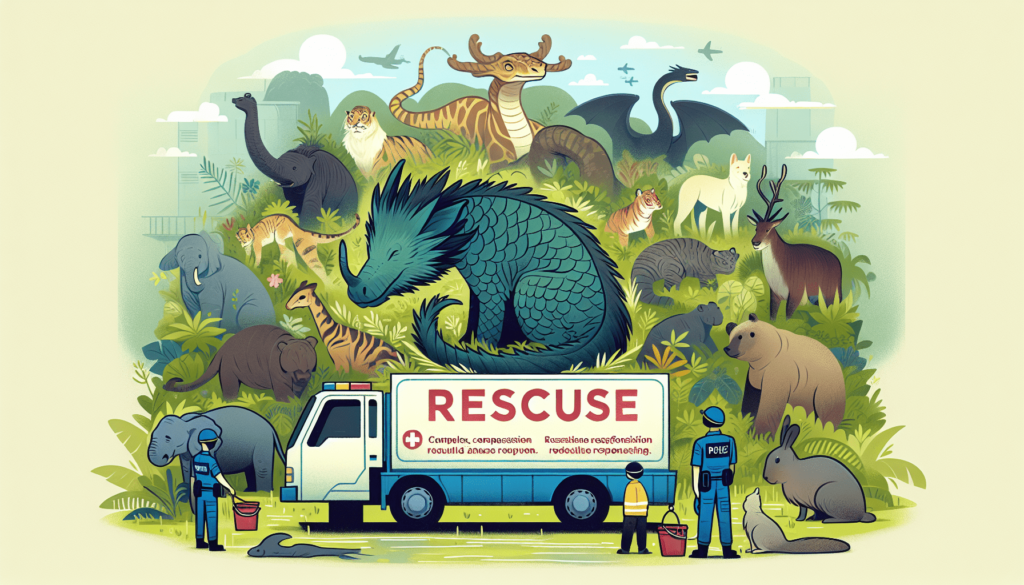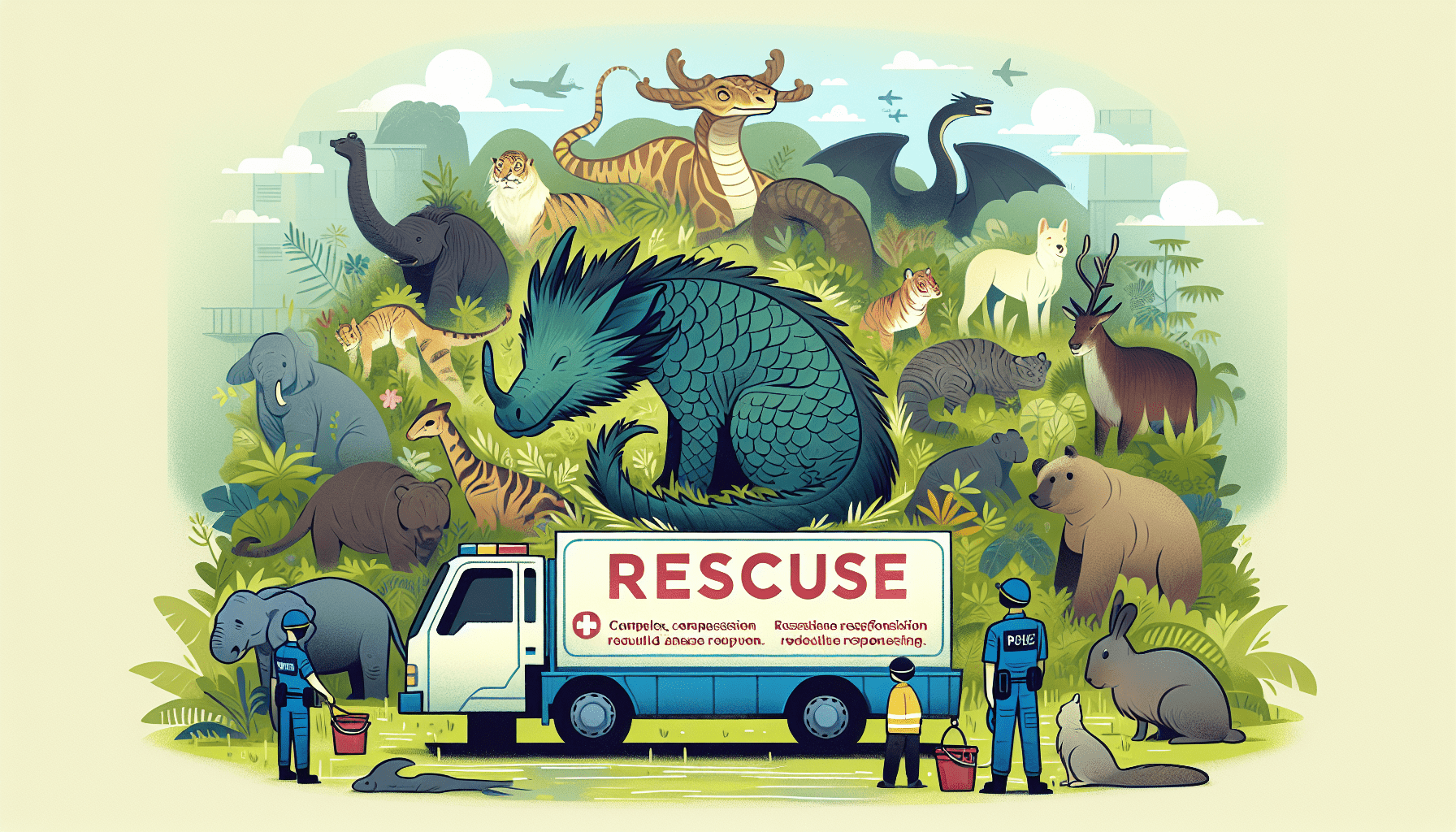Are you considering adopting an exotic pet? Before you make the leap, it’s important to understand the challenges and considerations that come with exotic pet rescue. From the unique needs and habitats of these fascinating creatures to the legal and ethical responsibilities that come with their ownership, this article explores the complex world of exotic pets rescue. Whether you’re a seasoned exotic pet owner or just starting your journey, this informative piece will provide valuable insights to help you make informed decisions and provide the best possible care for your exotic companion.

Legal Considerations
Researching local laws and regulations
Before embarking on the journey of owning an exotic pet, it is crucial to thoroughly research the local laws and regulations surrounding exotic animal ownership. Each jurisdiction may have its own set of rules, permit requirements, licensing procedures, and restrictions. By familiarizing yourself with these legal considerations, you can ensure that you are in compliance with the law and avoid any potential legal trouble down the road.
Obtaining necessary permits and licenses
In order to legally keep an exotic pet, it is often required to obtain permits and licenses from the appropriate authorities. These permits ensure that you have met the necessary criteria and are qualified to own and care for the specific species. It is important to understand the application process, any associated fees, and the ongoing requirements for permit or license renewal to maintain compliance with local regulations.
Understanding liability issues
Owning an exotic pet comes with inherent risks and potential liability issues. It is important to be aware of the potential dangers that may arise from owning a wild or non-native animal. Not only may there be risks to yourself, your family, and your property, but also to others who may come into contact with your pet. Understanding liability issues and taking necessary precautions can help prevent accidents and protect both you and others from harm.
Housing and Space Requirements
Providing appropriate enclosures
Exotic pets have unique housing and space requirements that need to be met in order to ensure their well-being. It is crucial to provide them with enclosures that are suitable for their size, activity level, and natural behaviors. Properly researching and constructing a suitable enclosure that provides ample space for movement, hiding, and exploration is essential.
Ensuring proper ventilation and temperature control
Maintaining proper ventilation and temperature control within the enclosures is vital for the health and comfort of exotic pets. Different species have different temperature and humidity needs, and it is important to create an environment that mimics their natural habitat as closely as possible. Regular monitoring and adjustments to the enclosure’s temperature and humidity levels will help ensure the well-being of your exotic pet.
Allowing for natural behaviors and enrichment
Exotic animals have evolved to engage in specific natural behaviors. It is important to provide opportunities for these behaviors to ensure their physical and psychological well-being. Enrichment activities, such as toys, climbing structures, and opportunities for foraging, should be incorporated into their daily routines. This will help prevent boredom and provide mental stimulation, ultimately leading to a happier and healthier pet.
Specialized Knowledge and Training
Learning about the specific needs of exotic species
Exotic species have specialized needs that differ from traditional pets. It is necessary to acquire knowledge and understanding of the specific requirements of the exotic species you intend to rescue. Researching their natural habitats, dietary needs, social behaviors, and any specific health concerns will help ensure you can provide the best possible care.
Gaining expertise in handling and behavior management
Exotic pets may have unique behaviors and handling requirements that may differ from domesticated animals. Understanding how to handle and interact with these animals in a safe and appropriate manner is essential for both their well-being and your own safety. Investing in training and education in handling techniques can help prevent accidents and improve the overall welfare of the animals under your care.
Seeking guidance from experienced professionals
No matter how much research and training you undertake, there is no substitute for the advice and guidance of experienced professionals in the field of exotic animal care. Consulting with veterinarians, zoologists, and other experienced individuals can provide valuable insights and help navigate any challenges that may arise. Building a network of knowledgeable individuals will provide ongoing support and resources for your rescue efforts.
Veterinary Care
Finding exotic animal veterinarians
Exotic animals often require specialized veterinary care that may not be readily available from traditional small animal veterinarians. It is important to locate and establish a relationship with veterinarians who are experienced and knowledgeable in the treatment of exotic species. They will be able to provide routine check-ups, vaccinations, and preventive care to ensure the health and well-being of your pets.
Providing regular check-ups and preventive care
Just like any other pet, exotic animals need regular check-ups and preventive care to maintain their health and catch any potential issues early on. Regular veterinary visits will help ensure that any underlying health problems are addressed promptly and appropriate preventive measures, such as vaccinations, parasite control, and dental care, are implemented.
Preparing for potential health emergencies
Despite our best efforts, health emergencies can sometimes occur. It is essential to have a plan in place and be prepared for such situations. This may involve having emergency contact information for specialized exotic pet veterinarians, having a first aid kit on hand, and understanding the steps to take in case of an emergency. Being prepared can make a significant difference in the outcome of a health crisis.

Diet and Nutrition
Researching the specific dietary requirements of each species
Different exotic species have unique dietary needs that must be met to ensure their optimal health. Researching and understanding the specific dietary requirements of the species you are caring for is crucial. This may include knowledge of their preferred food sources, appropriate supplementation, and feeding schedules. Providing a well-balanced and species-appropriate diet is essential for their overall well-being.
Sourcing appropriate food and supplements
Obtaining the necessary food and supplements for exotic pets can sometimes be a challenge. It is important to locate reputable suppliers or specialized pet stores that carry the appropriate food items for the species in your care. Ensuring that the food is fresh, of high quality, and free from contaminants will contribute to the overall health of your pets.
Monitoring and adjusting the diet as needed
As animals grow, age, and undergo different life stages, their dietary needs may change. Regularly monitoring their weight, body condition, and overall health will help determine if any adjustments need to be made to their diet. Consulting with an exotic animal veterinarian or a knowledgeable nutrition expert can provide guidance on appropriate adjustments to ensure their nutritional needs are met.
Environmental Enrichment
Creating stimulating and engaging environments
Exotic animals, just like any other pet, benefit from living in an environment that provides mental stimulation and opportunities for engagement. Creating enriching environments that mimic natural habitats, including providing hiding spots, climbing structures, and opportunities for exploration, can help prevent boredom and promote overall well-being.
Providing opportunities for mental and physical exercise
Exotic pets often have high activity levels and require regular mental and physical exercise. Providing opportunities for play, exercise, and exploration can help alleviate stress, prevent behavior problems, and promote a healthier lifestyle. This can be achieved through interactive toys, puzzles, or even setting up safe and supervised outdoor spaces for certain species.
Rotating and updating enrichment items
Keeping exotic pets engaged and stimulated requires a variety of enrichment items. It is important to regularly rotate and update these items to prevent habituation and maintain their interest. Introducing new toys, puzzles, or even rearranging their environment can provide fresh stimulation and prevent boredom.
Socialization and Interaction
Understanding species-specific social needs
Different exotic species have varying social needs, ranging from solitary to highly social. Understanding the social requirements of the species in your care is crucial for their well-being. Some species may require companionship, while others may prefer more solitary lifestyles. Providing appropriate socialization opportunities or respecting their need for solitude will contribute to their overall happiness and mental health.
Offering appropriate companionship or interaction
For species that thrive in social settings, providing appropriate companionship is essential. This may involve housing compatible individuals together or providing opportunities for interaction with their own kind. However, it is crucial to research and understand the dynamics and compatibility of the species before introducing them to ensure their safety and well-being.
Balancing socialization with individual preferences
While socializing exotic pets is important, it is equally important to respect their individual preferences and comfort levels. Some animals may be more reserved or less inclined to interact, and it is crucial to recognize and honor their boundaries. Balancing socialization with individual preferences will help create a positive and enriching environment for both you and your pets.
Safety Measures
Implementing secure enclosures and barriers
Exotic animals, due to their unique needs and behaviors, may require special precautions to ensure their safety. Implementing secure enclosures and appropriate barriers will help prevent escape and protect them from potential dangers. Regular inspections of enclosures and repairs to any damages are crucial to maintain a safe living environment.
Educating household members and visitors about potential risks
When owning exotic pets, it is important to educate and inform household members and visitors about the unique risks and potential dangers associated with these animals. This includes understanding proper handling techniques, recognizing signs of stress or aggression, and knowing how to respond in emergency situations. By educating everyone in your household and any visitors, you can minimize the risk of accidents or injuries.
Preparing for natural disasters or emergencies
In the event of natural disasters or emergencies, it is important to have a plan in place to ensure the safety of your pets. This may involve having emergency supplies on hand, knowing evacuation routes, and having a designated safe area where your pets can be relocated. Being prepared for unexpected situations can help mitigate potential risks and ensure the well-being of your pets.
Rescue Organization Support
Seeking reputable exotic pet rescue organizations
When considering exotic pet rescue, it is valuable to seek support and knowledge from reputable rescue organizations. These organizations have experience in rescuing, rehabilitating, and rehoming exotic animals, and can provide valuable guidance throughout the process. They can offer resources, advice, and potentially even assist in the adoption process.
Understanding the adoption process and requirements
Rescuing exotic pets and finding them suitable homes requires an understanding of the adoption process and requirements. Each rescue organization may have specific criteria and processes for adoption. This may involve home visits, reference checks, and sometimes even a trial period to ensure compatibility between the adopter and the animal. Taking the time to understand and fulfill these requirements will help ensure a successful adoption.
Building a support network with other rescue enthusiasts
Building a support network with other rescue enthusiasts who share a passion for exotic animals can provide a wealth of knowledge, advice, and support. Participating in online forums, joining local rescue groups, or attending workshops or conferences can help connect you with like-minded individuals. Sharing experiences and resources with others who are also involved in exotic pet rescue can be invaluable on your journey.
Ethics and Responsibility
Considering the impact on wild populations
Exotic pet ownership, if not done responsibly, can have negative consequences on wild populations. Before rescuing an exotic pet, it is important to consider the implications on the species’ wild populations and ensure that the individual being rescued is not contributing to illegal or unethical exotic pet trade. Promoting conservation efforts and supporting organizations dedicated to protecting wild habitats can help mitigate the impact on these populations.
Avoiding illegal or unethical exotic pet trade
The exotic pet trade can be rife with illegal and unethical practices. As an exotic pet rescuer, it is crucial to promote responsible ownership and avoid supporting this trade. This means refraining from acquiring animals through illegal or questionable sources and seeking out reputable breeders or rescue organizations when adding to your own population. By actively discouraging the exotic pet trade, we can help protect both the animals and their native habitats.
Promoting responsible ownership and education
Promoting responsible ownership and education is key to ensuring the well-being of exotic pets. Sharing knowledge and resources with others, advocating for proper legislation and regulations, and raising awareness about the unique needs of exotic animals can have a significant impact. By encouraging potential owners to consider adoption and educating them on the commitment and responsibilities of owning an exotic pet, we can help create a more responsible and compassionate community of pet owners.
In conclusion, rescuing and caring for exotic pets comes with its own set of challenges and considerations. From understanding legal requirements to providing appropriate housing and nutrition, there is much to learn and implement. Specialized knowledge, veterinary care, environmental enrichment, and proper socialization all contribute to the well-being of these unique and captivating animals. By approaching exotic pet rescue ethically and responsibly, we can make a positive impact on their lives and contribute to the preservation of their species in the wild.

